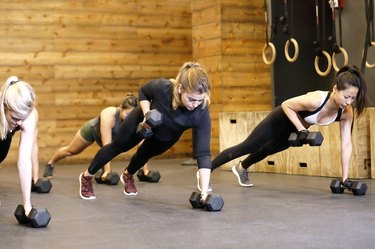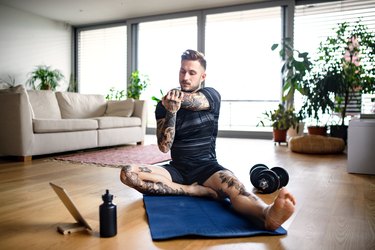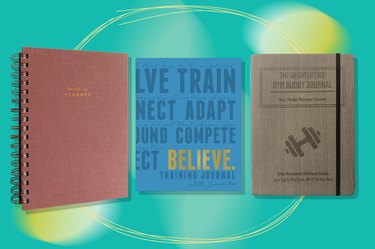
It can be tempting to kick off the new year by setting a big, audacious goal — like running your first marathon or completing a 100-mile bike ride. But just as important as setting a far-reaching goal is focusing on the steps you need to achieve along the way to set yourself up for success.
That's where short-term and process goals come in. It can be overwhelming to plan for a marathon several months away. What if you could just focus on what you have to do this week to get there — two or three runs at an easy pace? Creating concrete daily or weekly things to check off provides a sense of accomplishment and a much more manageable way to tackle long-term objectives.
Video of the Day
Video of the Day
Short-term and process goals also help you to stay connected to the journey of self-discovery — and that's the foundation you need to reach both short- and long-term fitness goals.
How to Set a Short-Term Fitness Goal
Short-term fitness goals can help you stay motivated on a daily and weekly basis, and can help you eventually achieve a long-term fitness goal. Short-term fitness goals should feel doable, and while they may provide a healthy challenge, should never be so intimidating as to cause you stress.
Like any good goal, short-term fitness goals should be specific, have a purpose and a measurable component (such as time, distance or number of repetitions), and be time-bound (doing an activity for one hour or an interval for two minutes).
Examples of Short-Term Fitness Goals
Ali Meehan, CPT, is a New Jersey-based NASM-certified personal trainer and ACE-certified group fitness instructor. She recommends the following as examples of good short-term fitness goals that can be modified or added to as desired.
1. Attend a Yoga or Mobility Class Twice a Week
"Mobility is essentially how well your joints move and their overall range of motion," Meehan says. "It's important to stay mobile so that daily activities such as walking, running and lifting weights can be performed pain-free. Committing to attending a yoga or mobility class each week can provide a strong foundation for other activities."
2. Learn to Do One Proper Push-Up
"A common short-term fitness goal is to build upper body strength by learning how to properly do a push-up," Meehan shares. "Once you learn the correct form for a push-up, you can add to the goal and aim to complete 10 push-ups."
3. Run Two Days a Week
"Running goals are popular short- and long-term fitness goals, as the barrier to entry to the sport is often quite low," Meehan explains. "Running can help improve both your physical and mental health, and it can be a form of socialization if you join a run club or running buddy."
Once you reach your first running goal, it's easy to add to your aspirations and turn running into a long-term achievement. Start small — a run-walk scheme of 2 minutes running, 1 minute walking is a great way to build up your fitness.
How Process Goals Help You Stay Focused
When you set a goal like completing a marathon, you are setting an outcome-focused goal. This means that meeting your goal relies on you achieving a certain outcome.
Outcome-focused goals can help motivate us to train consistently, push our limits and beat the clock, but they are not the only type of beneficial fitness goals.
Process goals de-emphasize the end result of whatever outcome goal you are tracking toward and place greater emphasis on meeting the steps in the process toward the larger goal.
One way to use process goals in tandem with short-term goals is to view process goals as the very smallest goals you need to meet in order to begin the journey to your end goal.
For example, if you want to achieve a headstand in yoga in the next six months, you need to have a doable schedule of yoga practices that likely involves several yoga classes each week.
Process goals focus on the traits and methodology needed to actually go to those classes, such as adjusting your schedule to be able to attend, eating well and staying hydrated — and remembering why the goal of doing a headstand is important to you.
Combine that with concrete short-term fitness goals and you have a rock-solid path to achieving success.
This concept is not new — an old but frequently-cited 1993 study in Psychological Review discussed the idea of "deliberate practice," or the idea that meaningful efforts over time can lead to optimized performance. Today, we call the idea of deliberate practice something else: process goals.
Arizona-based performance coach Brandon Thielk has worked with athletes of all levels to help them focus more on the process and less on a specific outcome.
"I'm a big fan of process-oriented goals because they help you dig deeper into why you're tackling a journey or vision," Theilk says. "Everything happens on its own, individual timeline, so focusing more on the process can lead to more enjoyment and fulfillment than only focusing on the outcome."
What Is a Process Goal?
Thielk describes a process goal as a "mindset orientation."
"It's not that you don't have a specific outcome you're trying to reach, it's just that with process goals, you're more focused on the day-to-day work that's going to get you there," Thielk explains. "A process goal is simply steps you are going to take that are going to facilitate that end outcome. Essentially, process goals are building the skills that will help you eventually reach the desired outcome."
For example, if you want to complete a 5K in the next three months, process goals that will help you achieve that outcome may include making it a goal to stay consistent with your training plan, to nail every workout that's over 1.5 miles and to commit to eating well during your training.
Leveraging process goals can help short-term goals, such as running twice a week to train for the 5K, seem less stressful and more of an enjoyable activity, not just a "to-do" item.
The study of human motivation and reward is a hot topic these days as scientists all over the world strive to find more answers to what entices humans and why.
According to a May 2014 study in the Journal of Cognitive Neuroscience, brain activity can scale and correlate with anticipated rewards and motivation levels — but that the scale and correlation of the brain activity doesn't always behave as expected.
Process goals are a type of motivation and reward mechanism that provide the opportunity for daily wins as you strive toward a larger goal.
Why Set Process Goals?
Process goals are about stacking the feeling of daily wins on a consistent schedule, making you enjoy the journey to your desired achievement. Using process goals alongside short-term fitness goals can help you stay on track each day and week, resulting in a better, stronger you in just a couple of months.
"Process goals focus on getting small wins on a daily basis," Thielk says. "Committing to the process to reach the goal will be more stable and fulfilling than being dependent on an outcome to make you feel accomplished."
Thielk goes on to say that when you are not dependent on a specific outcome in order to feel good about yourself, you instead become more intent on personal growth, which can be even more fulfilling than any one specific endpoint.
"Often, if you don't reach an outcome goal, you feel defeated and see your weaknesses as barriers," Thielk says. "But when you become committed to the process of a larger vision, you start to strip away that low self-esteem and see your weaknesses as opportunities, and ultimately enjoy tackling this journey for yourself and not for others."
By taking a big goal, like running a marathon, and breaking it down into short-term fitness goals, like completing three training runs a week, it is easier to feel fulfilled and to discover the process of fostering new healthy habits and mindsets along the way.
Benefits of Process Goals
Aside from assisting you in finding a love for the greater journey (and developing key life skills), process goals have a variety of other daily benefits, too.
1. They Stabilize Emotions
"The number one thing process goals do is stabilize emotions," Thielk says. "If you can find the wins and the progress daily in even the smallest of tasks, that's going to want to make you keep putting in the work and is going to prevent the peaks and troughs that arise from outcome-dependent goals."
2. Help You Learn to Manage Yourself — Effectively
"Process goals help you learn to take little steps on a daily basis to build momentum instead of massive, challenging leaps," Thielk shares. "Taking bite-size pieces that stack up to a bigger picture is much more sustainable than trying to tackle a goal all at once."
3. Build Self-Belief
"At some point, you have to believe that you can achieve whatever you're trying to accomplish," Thielk explains. "The way you reach that point is by stacking daily evidence that you have the skills needed to reach that larger goals. Process goals are one way of building those skills and stacking those recurring wins."
Bottom Line
If you want to avoid getting burnt out while striving for a big fitness goal, focus on the short-term, week by week things you can do to get you there. Along with short-term goals, process goals help you enjoy the journey to achieving the big goal — so no matter the outcome, you feel accomplished.
This combo is the best way to get to a better, stronger you over time.
How to Set Process Goals Alongside Short-Term Goals
Setting process goals can supplement your short-term fitness goals by helping you consider not just what daily or weekly steps you will take, such as training runs or yoga classes, to meet a larger goal, but what traits and smaller actions will set you up for daily and weekly success with those short-term goals.
It can be helpful to think about the skills needed to achieve your short-term goals, such as consistency, finding enjoyment in the task and resourcefulness.
From there, think about the daily actions that you can take that correlate with those skills. If we stick with our marathon example, one process goal could be using the skill of resourcefulness to research a training plan or coach who can help you set daily or weekly short-term fitness goals that will feel rewarding and eventually lead you to achieving a larger goal that may take more time to meet.
"It's important to remember that you don't have to create the process or process goals or short-term goals all on your own," Thielk says. "Reach out to a coach or trusted source to craft what the process looks like, what skills are needed, and what daily steps you'll take to get there."
Is this an emergency? If you are experiencing serious medical symptoms, please see the National Library of Medicine’s list of signs you need emergency medical attention or call 911.





